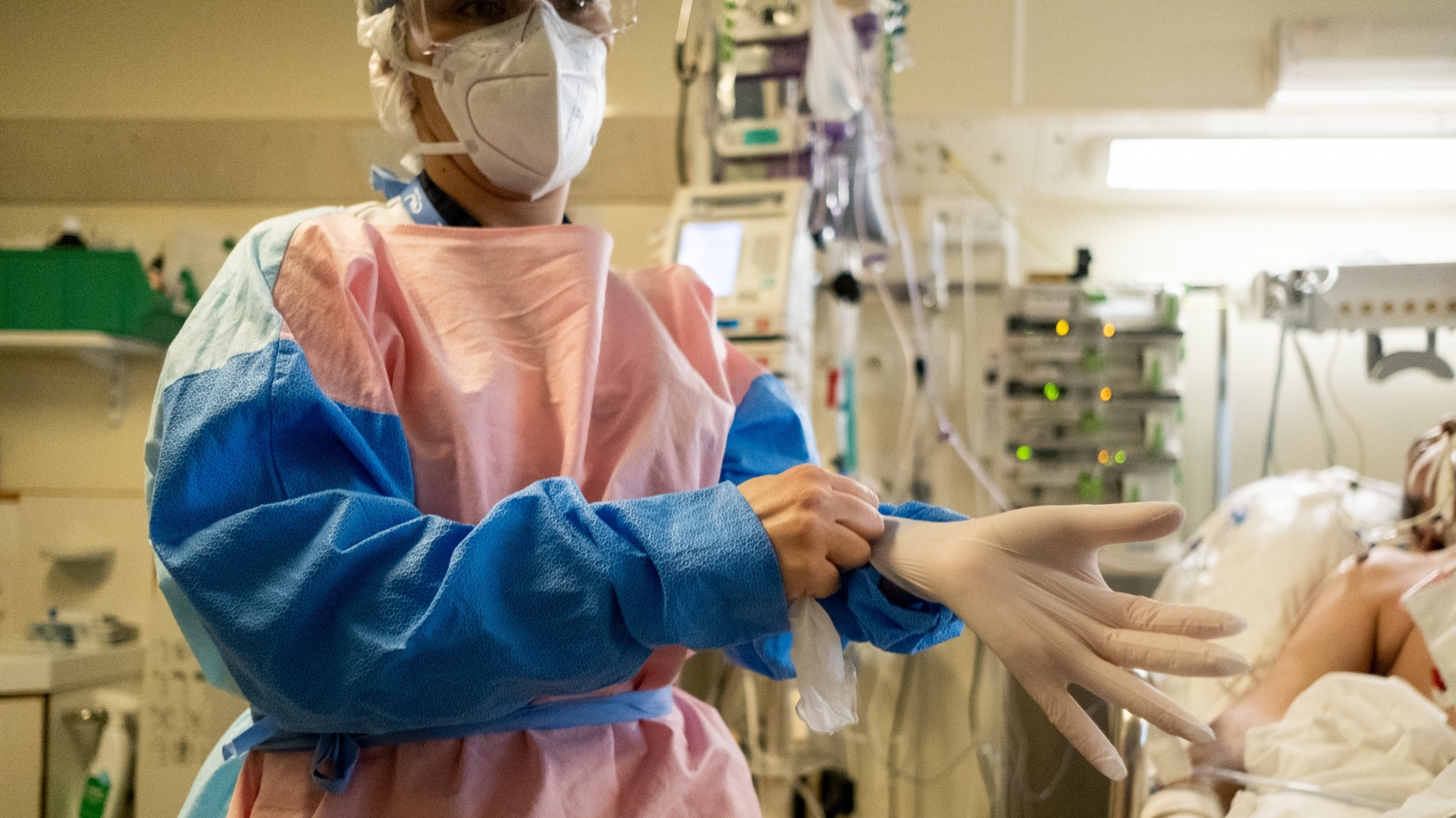Over three operating days since last Wednesday, Regional Medical Center in Anniston administered 202 monoclonal antibody treatments — the life-saving drugs that can reduce the need to hospitalize someone with COVID-19 by 70 percent — at a new clinic set up in a closed school.
But the hospital now has no more doses of the drug left. That’s according to Dr. Almena Free, vice president of medical affairs and chief medical officer at Stringfellow and Regional Medical Center, in a briefing Wednesday on Facebook Live.
The hospital exhausting its supply of the treatment comes as RMC experienced three COVID deaths within a 24 hour period that included Monday, Free said.
“Unfortunately, the Health and Human Services, along with Alabama Department of Public Health, are now appropriating the monoclonal antibody treatments, and we have none at this present time,” Free said. “We’re working very diligently with the state and the United States, the government, to get more monoclonal antibody in this area.”
The U.S. Department of Health and Human Services on Monday stopped allowing Alabama providers — and those in six other Gulf Coast states with low vaccination rates and high usage of Monoclonal antibody drugs — to directly order the drugs.
Instead, HHS plans to monitor case and use data in states, and the Alabama Department of Public Health will be charged with allocating the state’s supply to local providers. HHS also plans to limit shipments of the treatment to providers that have accounts with the government and can provide utilization data, according to The Washington Post.
“During this transition, our highest priority will be to ensure that the ordering process for monoclonal antibodies is in place, so Alabama healthcare providers can be sent needed products as soon as possible,” said State Health Officer Dr. Scott Harris in a statement Wednesday.
The federal government is now determining each state’s weekly allotment of monoclonal antibody treatment “based on cases and use on a week-by-week basis,” an Alabama Department of Public Health statement reads.
Attempts to reach an RMC spokeswoman after Free’s briefing were unsuccessful, but the Alabama Department of Public Health in a response said the state’s shortage this week was expected.
“ADPH is working with providers to implement the new process for ordering monoclonal antibodies and have requested that product be shipped as soon as possible,” said Nancy Bishop, state pharmacy director for the Alabama Department of Public Health, in a response to APR. “As expected, the quantity requested this week exceeds the amount allocated to Alabama by HHS. This is a weekly process so facilities that do not receive product this week may request it next week.”
It was unclear how many other state providers were also out of monoclonal antibodies Wednesday. ADPH didn’t answer APR’s question to that matter.
A note on the 10th Street clinic’s door, posted Tuesday, reads that due to the lack of lead time on the drug’s delivery “our ability to provide this life saving monoclonal antibody medication has become extremely difficult.”
“Currently, our health system made the decision to “press pause” on providing antibody injections until a firm medication shipment date from ADPH is obtained,” the notice reads. “Until then, we strongly suggest you reach out to your primary care provider of any significant changes in your COVID status. Your provider may want to change your medication regimen after she/he is fully aware you have not received the antibody injections. The RMC Health System understands the need to supply this medication for our community and hopes to have the program back on line soon.”
Monoclonal antibody treatment, manufactured by the company Regeneron, can cut the need to hospitalize a COVID patient by 70 percent if given within 10 days of infection, according to medical experts. ADPH notes, however, that the drug is not a replacement for COVID vaccines, which have been found to be safe and effective at preventing serious illness, hospitalization and death.
RMC was caring for 69 COVID patients on Wednesday, down from 96 last week, Free said.
In one of two of the hospital’s COVID units, the hospital has 24 patients but just 22 ICU beds, she said, with 90 percent of those patients being unvaccinated. RMC has a total of 33 ICU beds devoted to COVID patients.
Beyond the bed shortage, staffing is stretched thin at RMC, Free said. Nurses who would have been working elsewhere in the hospital have been moved into the COVID units to care for ICU patients there, and instead of caring for just two patients, those nurses are now tasked with caring for three, she said.
“It’s very difficult, but this is what we’re doing,” Free said.
RMC opened the monoclonal antibody clinic at the former 10th Street Elementary School in Anniston on Sept. 3, the same day HHS announced that seven Gulf Coast states would be receiving 30 percent of what they had been ordering.
“We had two deaths last night, one death this morning,” Free told The Anniston Star on the day the clinic opened.
Alabama hospitals statewide on Tuesday had 43 fewer ICU beds than patients needing that care, with 48 percent of patients in ICUs having COVID-19, according to the Alabama Hospital Association.
Dr. Sarah Nafziger, vice president of clinical support services at UAB Hospital, in a briefing with reporters Wednesday said she didn’t yet see cause for alarm with respect to the state’s supply of monoclonal antibody treatments “but definitely there’s an ongoing dialogue” between state hospitals, the Alabama Hospital Association and the government entities that will distribute the drugs “about how the decisions will be made about how much antibody treatment goes to different facilities and how they’ll be allocated.”
“If I do see cause for alarm, I’ll be one of the first people you’ll hear from, who will be raising an alarm that, ‘Hey, we’re not getting what we need to take care of the patients,'” Nafziger said.
Alabama has the fourth-lowest percentage of fully vaccinated residents in the nation, at 40.2 percent, behind only Idaho, West Virginia and Wyoming, according to the Centers for Disease Control and Prevention.
Alabama’s COVID hospitalizations statewide have been on the decline recently. There were 2,401 COVID hospitalizations on Tuesday, a 15 percent drop from two weeks before, and while Nafziger said a decline in new cases is driving that reduction in the state’s hospitalization number, so too are COVID deaths.
“We’ve seen a lot of people who have died from COVID,” Nafziger said.
Alabama hospitals have reported 557 COVID deaths in the 10 days ending Tuesday, and averaged 55 deaths daily during that time, according to Alabama Hospital association data compiled and shared by East Alabama Health. It can take the Alabama Department of Public Health weeks to review medical records to confirm those deaths were due to COVID-19, so the department’s confirmed daily death toll lags behind actual daily deaths.



















































